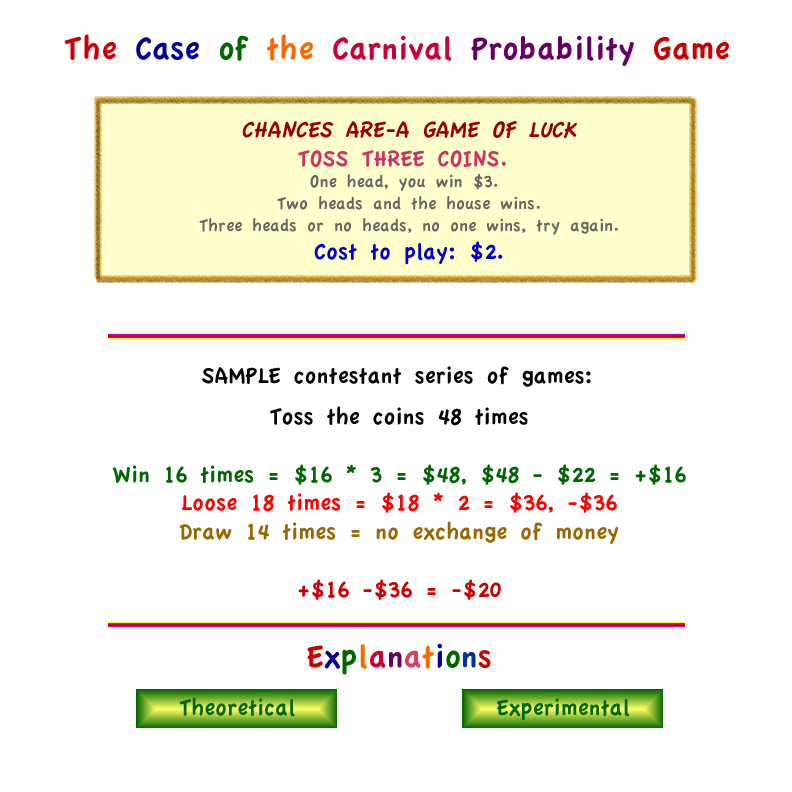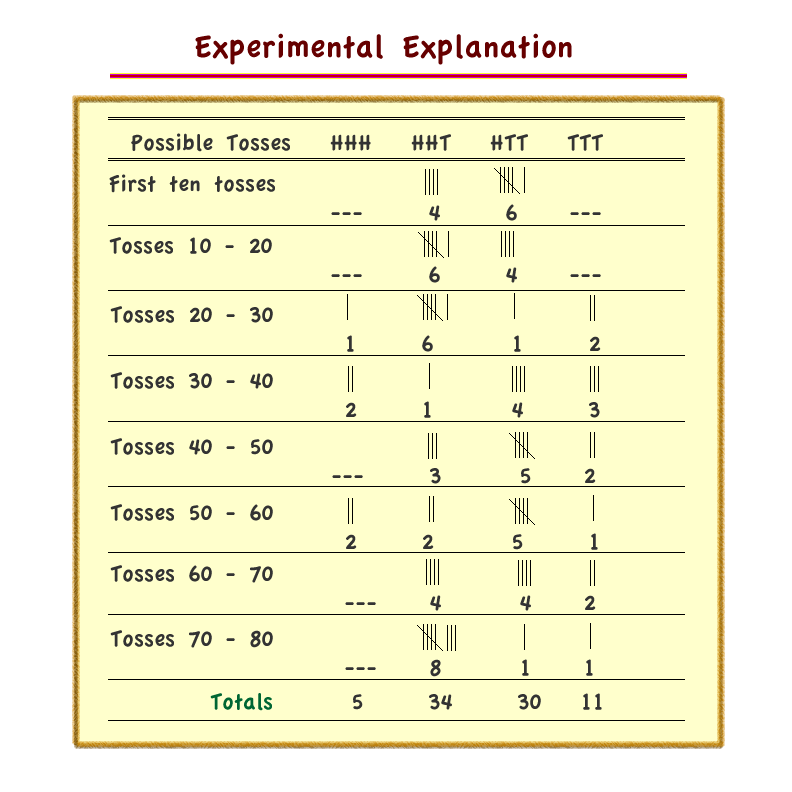Probability
Development of probability
Probability can be guessed at perceptually or determined systematically. However, to determine probability systematically a person needs to be able to figure all the possible outcomes, which requires combinatorial representation, and to be able to compare each outcome or group of outcomes as proportions.
Perceptually young children can describe probability comparing visual representations, which may be done accurately or not, depending on their development. They may be fooled by thinking a certain amount is more or less if they are not able to conserve. It looks like there are more red so I will guess red. So young children begin to determine probability by visual comparison and using more, less, or none to equate to probabilistic terms of likely or probable, not likely, as certain, possible, impossible.
However, being able to conserve and accurately determining cardinality isn't sufficient to determine probability as mentioned above.
Sample problem

Experimental

Theoretical

The Case of the Carnival Probability Game
The Cast:
- Police Chief
- Vendor
- Cousin Norman
- Cal Q.
- Narrator
The Story
Narrator: The smells of buttered popcorn, cotton candy, and fried dough filled the air as Midville Police Chief Arthur Smart and his partner, 12-year old detective Cal Q. Letter, passed through the gates of the 85th annual Midville Fair. The Chief had been asked to participate in the pie-eating contest, and Cal had tagged along to support him.
Chief: "You know, it's gonna be difficult to stick to my diet today". He stopped in front of Perry's Pizza booth. "Maybe I'll have just a tiny slice of pizza before the contest".
Cal: "Do you really think that's a good idea, Chief?"
Narrator: Chief blurts out.
Chief: "Hey, look. That's my cousin Norman arguing with that vendor over there."
Narrator: Cal looked across the way and spotted a short, pudgy man who could pass for the Chief's twin gesturing wildly and stomping up and down. The Chief and Cal rushed over to see what the commotion was all about. The vendor, a lanky man with long sideburns, stood behind his counter, shaking his head smugly.
Vendor: (Points to Cousin Norman) "You lost, fair and square."
Chief: (Placing a hand on Norman's shoulder) "Norman, what's going on here? I've never seen you this angry."
Norman: "I'll tell you what's going on here" (Grits his teeth) "A bigtime ripoff! This guy here is running some sort of crooked scam. I just can't figure out how he's doing it."
Narrator: Cal looked up at the sign over the booth. It read: "CHANCES ARE - A GAME OF LUCK. Toss three coins. One head, you win $3. Two heads and the vendor wins Three heads or no heads, no one wins, and we roll again. Cost to play: $2."
Chief: "Let me get this straight; let's say you play once and win. It cost you $2 to play, and you won $3, so you really made $1. Isn't that right, Cal?"
Narrator: Cal nodded and began drawing a diagram in his math notebook.
Chief: "And if you lose, you lose the $2 you paid to play, right?"
Narrator: Again Cal nodded.
Vendor: "Look, it's twice as hard to get two heads as it is to get one head. That's why it's a fair deal that if I win, I get twice as much as when I lose."
Chief: "Makes sense to me."
Norman: "Wait, I've played this game 48 times. I've won 16 times, he's won 18 times; neither of us won 14 times. I've lost $20 to this schemer. That shouldn't happen, should it?"
Vendor: (With a smirk) "Hey haven't you heard of a lucky streak?"
Narrator: The Chief picked up the three coins from the counter and carefully examined each of them.
Chief: "Nothing's wrong with the coins, Norman. Look, I'm sorry you lost, but it appears that this just wasn't your day. That's all."
Norman: "It doesn't make sense. Probability says I should have won twice as often as he did and that we should have broken even money-wise, doesn't it?"
Cal: "No, it doesn't. In fact, things pretty much went according to probability. Your cousin is not correct about probability, but he is correct about one thing: This game is a ripoff. Big time. This vendor has a guaranteed winner with his game."
Chief: "Well, that's enough for me." Turning to the vendor: "You, sir are shutting down and coming downtown with us."
How is this game unfair? What did Cal figure out?